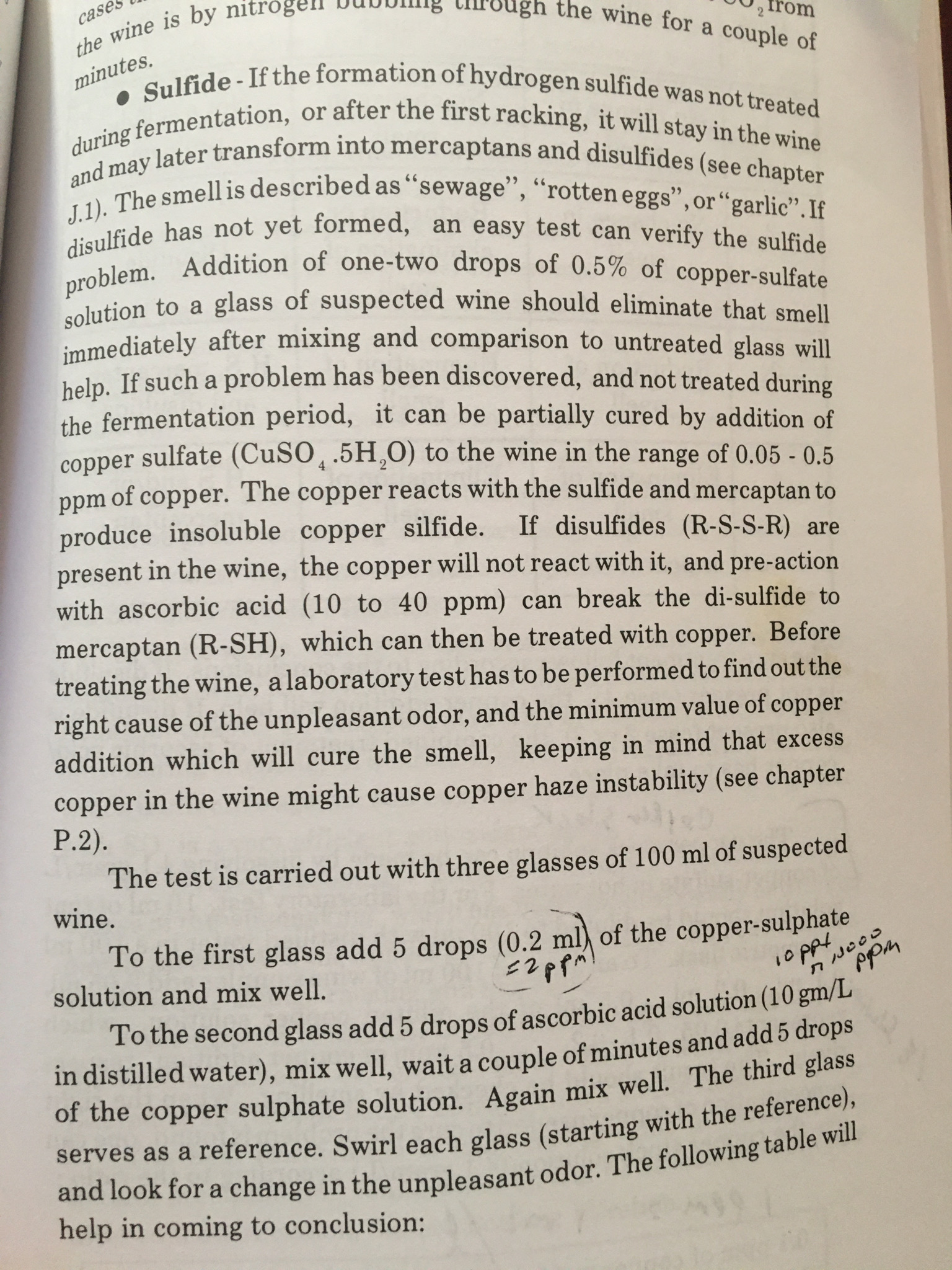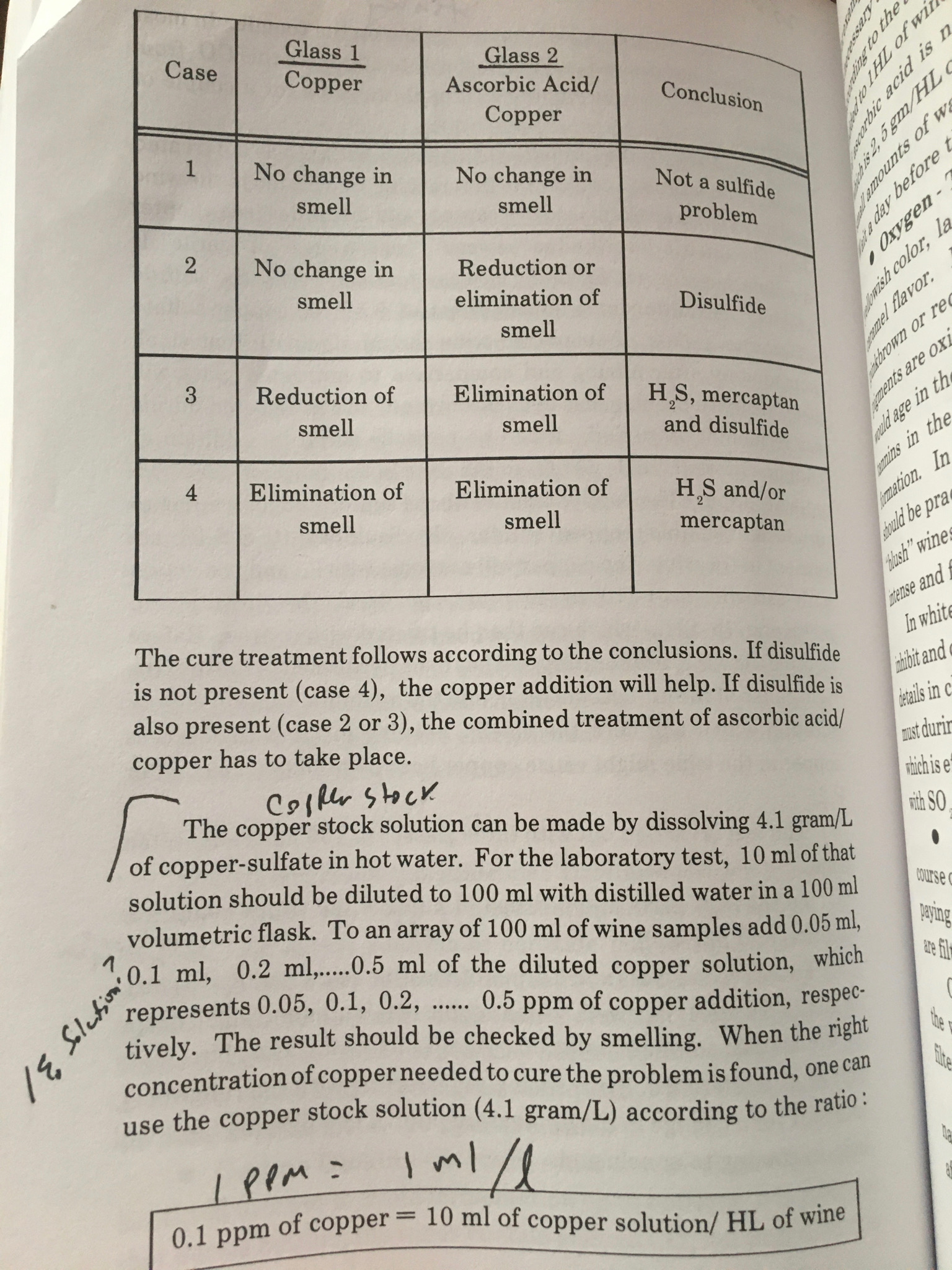You are using an out of date browser. It may not display this or other websites correctly.
You should upgrade or use an alternative browser.
You should upgrade or use an alternative browser.
Copper products
- Thread starter RPh_Guy
- Start date

Help Support Homebrew Talk:
This site may earn a commission from merchant affiliate
links, including eBay, Amazon, and others.
gregbathurst
Well-Known Member
I have used copper sulfate, years ago. You only need a tiny amount. my method - dissolve a teaspoon in 100ml water, dissolve a teaspoon of that solution in 100ml water, use a teaspoon of that solution in 20L of cider
I've had success removing sulfide aromas by adding a 2" piece of 1/2 copper pipe to my keg for 1-2 days until the sulfide aromas dissipated. I boiled the copper prior to adding it in order to sanitize it. One could hang the piece of copper by a thread for easy retrieval.
While adding solid copper (e.g. pipe) is not as effective as copper sulfate, it is completely safe with negligible risk of overdosing the cider. Just don't leave the copper in the fermenter too long (more than a week?) as cider is mildly acidic and will begin to dissolve the copper.
While adding solid copper (e.g. pipe) is not as effective as copper sulfate, it is completely safe with negligible risk of overdosing the cider. Just don't leave the copper in the fermenter too long (more than a week?) as cider is mildly acidic and will begin to dissolve the copper.
Blacksmith1
Captain Cheap
I have a 2 ft long 1/2 inch pipe I stir with for sulphur. I also have a handfull of 1/2 inch caps I stick in a giant teaball I got at an oriental market that I can hang from the rim for the more stubborn batches.
RPh_Guy
Bringing Sour Back
I'm guessing you don't know the strength of the copper sulfate you used?I have used copper sulfate, years ago. You only need a tiny amount. my method - dissolve a teaspoon in 100ml water, dissolve a teaspoon of that solution in 100ml water, use a teaspoon of that solution in 20L of cider
It's interesting that most people just improvise when we have inexpensive products specifically made for this purpose.... Which make it easy to add specific amounts and avoid copper overdose.
I don't think using copper piping makes the risk of overdose negligible. Put a penny in a taster glass with some cider and swirl it around for 30 minutes. It'll taste like copper. It's effective at removing the H2S but the flavor is rather harsh afterwards. I prefer a more scientific approach whenever possible.
gregbathurst
Well-Known Member
H2S is detectable in very low concentrations, just a few parts per billion, so the amount of copper you need is really tiny. It is hard to measure such small amounts in homebrew volumes. You can be more scientific or use the commercial copper products, but my method works and won't add toxic or detectable amounts.

$33.99 ($17.00 / Count)
$41.99 ($21.00 / Count)
2 Pack 1 Gallon Large Fermentation Jars with 3 Airlocks and 2 SCREW Lids(100% Airtight Heavy Duty Lid w Silicone) - Wide Mouth Glass Jars w Scale Mark - Pickle Jars for Sauerkraut, Sourdough Starter
Qianfenie Direct

$58.16
HUIZHUGS Brewing Equipment Keg Ball Lock Faucet 30cm Reinforced Silicone Hose Secondary Fermentation Homebrew Kegging Brewing Equipment
xiangshuizhenzhanglingfengshop

$28.98
Five Star - 6022b_ - Star San - 32 Ounce - High Foaming Sanitizer
Great Fermentations of Indiana

$53.24
1pc Hose Barb/MFL 1.5" Tri Clamp to Ball Lock Post Liquid Gas Homebrew Kegging Fermentation Parts Brewer Hardware SUS304(Liquid Hose Barb)
yunchengshiyanhuqucuichendianzishangwuyouxiangongsi

$176.97
1pc Commercial Keg Manifold 2" Tri Clamp,Ball Lock Tapping Head,Pressure Gauge/Adjustable PRV for Kegging,Fermentation Control
hanhanbaihuoxiaoshoudian

$7.79 ($7.79 / Count)
Craft A Brew - LalBrew Voss™ - Kveik Ale Yeast - For Craft Lagers - Ingredients for Home Brewing - Beer Making Supplies - (1 Pack)
Craft a Brew

$719.00
$799.00
EdgeStar KC2000TWIN Full Size Dual Tap Kegerator & Draft Beer Dispenser - Black
Amazon.com

$22.00 ($623.23 / Ounce)
AMZLMPKNTW Ball Lock Sample Faucet 30cm Reinforced Silicone Hose Secondary Fermentation Homebrew Kegging joyful
无为中南商贸有限公司

$159.99 ($26.66 / Count)
3M High Flow Series System BREW120-MS, 5616001, For Brewed Coffee and Hot Tea, Valve-in-Head Design
SpaceCityProviders

$44.99
$49.95
Craft A Brew - Mead Making Kit – Reusable Make Your Own Mead Kit – Yields 1 Gallon of Mead
Craft a Brew

$479.00
$559.00
EdgeStar KC1000SS Craft Brew Kegerator for 1/6 Barrel and Cornelius Kegs
Amazon.com

$20.94
$29.99
The Brew Your Own Big Book of Clone Recipes: Featuring 300 Homebrew Recipes from Your Favorite Breweries
Amazon.com

$76.92 ($2,179.04 / Ounce)
Brewing accessories 1.5" Tri Clamp to Ball Lock Post Liquid Gas Homebrew Kegging Fermentation Parts Brewer Hardware SUS304 Brewing accessories(Gas Hose Barb)
chuhanhandianzishangwu

$10.99 ($31.16 / Ounce)
Hornindal Kveik Yeast for Homebrewing - Mead, Cider, Wine, Beer - 10g Packet - Saccharomyces Cerevisiae - Sold by Shadowhive.com
Shadowhive
![Craft A Brew - Safale S-04 Dry Yeast - Fermentis - English Ale Dry Yeast - For English and American Ales and Hard Apple Ciders - Ingredients for Home Brewing - Beer Making Supplies - [1 Pack]](https://m.media-amazon.com/images/I/41fVGNh6JfL._SL500_.jpg)
$6.95 ($17.38 / Ounce)
$7.47 ($18.68 / Ounce)
Craft A Brew - Safale S-04 Dry Yeast - Fermentis - English Ale Dry Yeast - For English and American Ales and Hard Apple Ciders - Ingredients for Home Brewing - Beer Making Supplies - [1 Pack]
Hobby Homebrew

$53.24
1pc Hose Barb/MFL 1.5" Tri Clamp to Ball Lock Post Liquid Gas Homebrew Kegging Fermentation Parts Brewer Hardware SUS304(Gas MFL)
Guangshui Weilu You Trading Co., Ltd
RPh_Guy
Bringing Sour Back
I appreciate you sharing but I'm still missing some details. You're starting with a "teaspoon" of what? Copper(II) sulfate pentahydrate powder/granules?H2S is detectable in very low concentrations, just a few parts per billion, so the amount of copper you need is really tiny. It is hard to measure such small amounts in homebrew volumes. You can be more scientific or use the commercial copper products, but my method works and won't add toxic or detectable amounts.
If a teaspoonful of copper sulfate pentahydrate is 5 grams, then your method delivers 0.14ppm copper (if I did the math right).
I have no problem doing a serial dilution if it's needed for the best results.
Other methods are not difficult, arguably less difficult than a serial dilution. Reduless is simple to measure and delivers 0.02ppm copper with the suggested usage rate, for example.
I'm wondering if anyone might have tried multiple ways/products and can compare them? People using copper pipes have no clue about how much copper is getting into the wine/cider. The average "taste threshold" of copper in water is only a couple ppm, but I believe it's possible to be below taste threshold and still negatively impact the wine/cider if too much is added, plus I'm a super taster, so the average thresholds don't really apply to me.
gregbathurst
Well-Known Member
I haven't used reduless, I'm sure it's a better solution, ha ha, but copper sulfate is easier for me to get, you asked for experiences. My method is just an easy way to deliver a very small amount of copper, you could start with half the amount if you want to be careful, if it doesn't work initially you can keep adding doses. I don't often get h2s problems.
RPh_Guy
Bringing Sour Back
You're talking about the pentahydrate solid???copper sulfate is easier for me to get
gregbathurst
Well-Known Member
Sorry, I don't have it anymore, I just remember buying blue granulated powder.You're talking about the pentahydrate solid???
Blacksmith1
Captain Cheap
I have some large blue copper sulfate crystals, 90% and 99%. My dad and grandfather used it to kill trees. I feel safer using my plumbing parts. And all I do is stir till the smell is almost gone. Then wait. Advice i was given here concerning a "nuclear option" IIRC.
RPh_Guy
Bringing Sour Back
Yeah, that was me.Advice i was given here concerning a "nuclear option" IIRC.
Aeration + copper definitely removes H2S, within a couple minutes. However, I want to also make sure there's no harshness from oxidation or excess copper, more like a tactical nuke, or "smart bomb"?
Sounds good, thanks. Almost all the comments I've read about using straight copper sulfate were negative, so you were one of the few using it correctly, apparently.I haven't used reduless, I'm sure it's a better solution, ha ha, but copper sulfate is easier for me to get, you asked for experiences. My method is just an easy way to deliver a very small amount of copper, you could start with half the amount if you want to be careful, if it doesn't work initially you can keep adding doses. I don't often get h2s problems.
gregbathurst
Well-Known Member
I can understand not wanting to use straight copper sulfate, you have to be careful and understand the nature of the problem. Using a piece of copper means you don't know how much copper you are adding. If you need to add copper regularly you should order some reduless or similar. I have a vineyard as well as an orchard, some vineyards use copper oxychloride spray to control downy mildew, that way you can say you are "organic". They use up to 6kg of copper per hectare (per year), I think it's crazy when there are much better alternative fungicides, that's a lot of copper to put into the environment.
I have had some stinky results recently. Copper seems to fix some. I have been twisting and bending romex into key fobs for handy copper.
Other batches don't seem to respond. So, either:
1- it isn't a sulphide issue. or
2- it is more complicated (mercaptins and dimethyl sulphide are terms that come up).
For option 2, my research indicates I have to reduce the compounds with ascorbic acid before being able to fix things with copper.
From Wine Technology & Operations:
My photo upload doesn't seem to work. Here's a shared album with the 2 relevant pages:
https://www.icloud.com/sharedalbum/#B0hGWZuqDGjsDBr

Other batches don't seem to respond. So, either:
1- it isn't a sulphide issue. or
2- it is more complicated (mercaptins and dimethyl sulphide are terms that come up).
For option 2, my research indicates I have to reduce the compounds with ascorbic acid before being able to fix things with copper.
From Wine Technology & Operations:
My photo upload doesn't seem to work. Here's a shared album with the 2 relevant pages:
https://www.icloud.com/sharedalbum/#B0hGWZuqDGjsDBr
RPh_Guy
Bringing Sour Back
Great info! Thank you!For option 2, my research indicates I have to reduce the compounds with ascorbic acid before being able to fix things with copper.


Similar threads
- Replies
- 6
- Views
- 498
- Replies
- 1
- Views
- 279









































